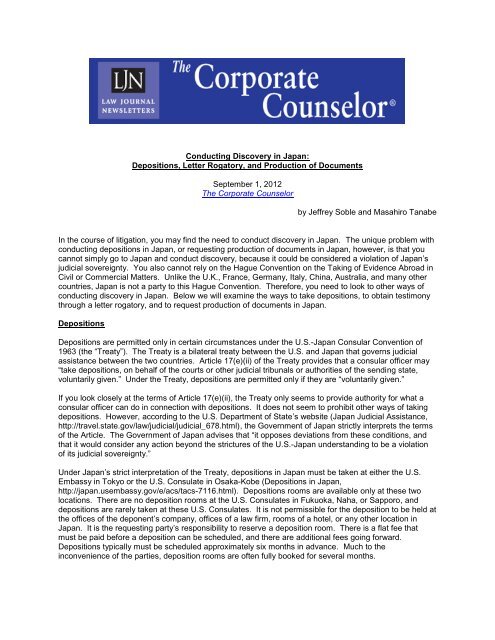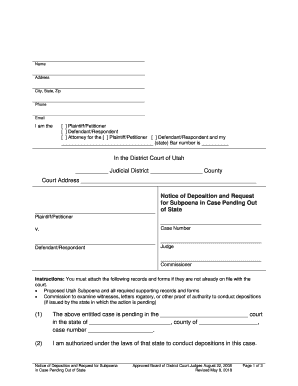How to Effectively Use Letters Rogatory in Cross-Border Legal Instances
How to Effectively Use Letters Rogatory in Cross-Border Legal Instances
Blog Article
Letters Rogatory Explained: Facilitating Legal Participation Between Countries

Definition of Letters Rogatory
Letters rogatory are formal demands made by a court in one jurisdiction to a court in one more territory, seeking support in getting evidence or statement for a lawful case. This procedural system is essential in the context of worldwide regulation, where legal systems may differ, and cross-border participation is necessary. Letters rogatory assist in the celebration of information that may be important for settling instances, especially in instances including intricate global issues.
Usually, these demands emerge in civil, criminal, or management issues where a party requires evidence that lies outside the jurisdiction of the asking for court. The letters serve as a way to make sure that the concepts of due procedure are promoted, making it possible for courts to access evidence that might otherwise remain unattainable because of geographical or legal barriers.
Making use of letters rogatory is regulated by worldwide treaties, bilateral agreements, or domestic laws, which delineate the procedures and obligations of the courts involved. It is essential to note that the implementation of such demands is not assured; they depend upon the legislations and methods of the jurisdiction receiving the letter. Thus, letters rogatory are a pivotal device for promoting lawful collaboration and guaranteeing justice across boundaries.
The Process of Issuing Letters Rogatory
Issuing letters rogatory entails an organized process that ensures conformity with both international and residential lawful requirements. The requesting event, usually a court or legal authority, composes a formal demand detailing the nature of the aid looked for, the proof or details required, and the lawful basis for the request. This record needs to be exact to help with understanding by the international jurisdiction.

The following action entails sending the letters rogatory to the assigned foreign authority. This is typically done with diplomatic networks or global lawful support frameworks, guaranteeing that the request is obtained and recognized by the foreign court. The foreign court after that refines the request according to its own lawful treatments, ultimately responding to the asking for celebration with the popular information or proof, hence assisting in worldwide legal participation.
Relevance in International Legislation
The importance of letters rogatory in international regulation can not be overstated, as they function as a crucial device for judicial teamwork across borders. These official ask for support in lawful issues allow courts in one territory to inquire, evidence, or the existence of witnesses from another territory, consequently facilitating the management of justice in global cases.
Letters rogatory are particularly essential in the context of globalization, where lawful disputes often cover numerous countries. They allow the collection of evidence that could otherwise be hard to reach, making sure that lawful proceedings are informed and reasonable. By promoting partnership in between judicial systems, letters rogatory aid copyright the guideline of law and promote common regard amongst nations.
Additionally, making use of letters rogatory demonstrates a commitment to global standards and concepts of participation, reflecting the interconnected nature of modern-day lawful methods. It highlights the importance of sticking to well established treatments and treaties, such as the Hague Convention, which supplies a structure for these requests - Letters rogatory. Ultimately, letters rogatory boost the efficacy of lawful procedures, ensuring that justice is not impeded by geographical limits
Obstacles and Limitations
Despite their relevance, letters rogatory face numerous difficulties and restrictions that can hinder their effectiveness. One primary issue is the differing legal structures and treatments throughout territories, which can bring about misunderstandings and hold-ups in the execution of demands. Various countries may have distinctive requirements for the validity of letters rogatory, complicating the procedure better.
Additionally, the usually protracted nature of international legal participation can prevent timely access to evidence or witnesses. This hold-up may detrimentally influence ongoing examinations or legal procedures, especially in cases requiring immediate action. Furthermore, the lack of sources and training in some jurisdictions can lead to inadequate handling of demands, bring about poor or insufficient feedbacks.
Cultural differences and varying mindsets towards legal procedures can also present substantial obstacles. Countries with much less formal legal systems may struggle to comply with the step-by-step rigor expected in letters rogatory. Political tensions between nations can influence the determination to perform requests, resulting in a lack of teamwork and diminishing the utility of this system in international regulation. These difficulties demand continual dialogue and reform to boost the effectiveness of letters rogatory in legal collaboration.
Study and Instances

Conversely, obstacles can arise, as seen in an instance including a European nation seeking evidence in an ongoing criminal issue from a non-EU country - Letters rogatory. The procedure was delayed because of governmental obstacles and varying legal criteria, ultimately impeding the examination
These instances highlight that while letters rogatory can assist in international collaboration and accelerate lawful proceedings, they also highlight the requirement for their website clear communication and understanding of legal frameworks in between nations. Such situation researches highlight the relevance of refining this device to enhance efficiency and effectiveness in international legal issues.
Verdict
In recap, letters rogatory function as an important mechanism for promoting lawful participation between countries, making certain the collection of evidence and testament throughout territories. Their significance in international legislation can not be overstated, as they advertise due procedure and enhance the performance of cross-border lawful proceedings. Obstacles such as varying legal frameworks and political stress might hinder their efficiency. Continued initiatives to improve the process and streamline are necessary for fostering more powerful international judicial cooperation.
Letters rogatory are official demands made by a their explanation court in one territory to a court in an additional jurisdiction, looking for aid in getting proof or statement for a legal case. The asking for event, usually a court or legal authority, drafts an official request detailing the nature of the help sought, the evidence or info needed, and the lawful basis for the demand. The international court after that refines the request according to its very own lawful treatments, ultimately reacting to the asking for celebration with the sought-after information or evidence, therefore helping with global lawful participation.
Moreover, the use of letters rogatory shows a commitment to international norms and concepts of cooperation, mirroring the interconnected nature of my latest blog post modern lawful techniques.Global legal collaboration with letters rogatory is not without its real-world ramifications, as illustrated by numerous situation studies that highlight both challenges and successes.
Report this page